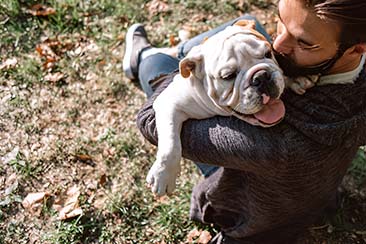Living in a city is a vibrant and exciting experience, but it also presents unique challenges, especially for pet owners. One of the biggest questions new pet owners often ask is, “Which are the best dogs to own in a city?” There’s a lot to consider when choosing the right breed for urban living, from lifestyle compatibility and training requirements to health considerations and pet insurance costs.
Let’s explore some of the top breeds for city dwellers, focusing on these critical aspects.
1. French Bulldogs
For those living in apartments or condos, French Bulldogs make excellent companions. They’re small, typically weighing under 28 pounds, which makes them ideal for spaces with size restrictions. With their relatively low energy levels, they don’t require as much exercise as some other breeds, making them well-suited to the urban lifestyle.
Training a French Bulldog can be both a joy and a challenge. They’re intelligent, but also somewhat stubborn. A consistent, positive reinforcement-based training method usually works best.
Health-wise, French Bulldogs are prone to certain breed-specific conditions, such as hip dysplasia and brachycephalic syndrome. Regular veterinary check-ups are essential to monitor their health.

2. Cavalier King Charles Spaniels
Cavalier King Charles Spaniels are another excellent choice for city living. They’re small, adaptable, and known for their friendly and affectionate nature. They don’t require a ton of exercise, but they do enjoy a good walk around the neighbourhood or a romp in the local dog park.
Training Cavaliers is generally a pleasant experience. They’re eager to please and respond well to positive reinforcement techniques.
As for health, Cavaliers can be prone to certain issues such as heart disease (specifically mitral valve disease) and syringomyelia. Regular health checks are crucial to keep them in tip-top shape.
3. Basset Hounds
Basset Hounds are a great fit for those looking for a larger dog that’s still suitable for city living. They’re known for their laid-back nature and require less exercise than you might expect for their size.
Bassets are intelligent, but they can also be stubborn. Patience and consistency are key when training these dogs.
Basset Hounds are generally healthy, but they can be prone to obesity due to their love for food and their less active nature. It’s crucial to monitor their diet and ensure they get adequate exercise.
4. Shih Tzus
Shih Tzus are small dogs with big personalities, making them a fantastic companion for city dwellers. They adapt well to apartment living and don’t require a lot of exercise, but they do enjoy a daily stroll or playtime.
Shih Tzus are usually easy to train, as they love to please their owners. However, housebreaking can sometimes be a challenge.
In terms of health, they can be prone to certain issues, such as eye problems and hip dysplasia. Regular vet check-ups are a must.

5. Bichon Frise
Bichon Frises are widely adored for their jovial nature and compact size, traits that make them ideal city dogs. These fluffy balls of happiness have a mischievous confidence that can brighten up any apartment, no matter how small. They are reasonably active, which means you’ll need to set aside some time for walks and play, but not as much as with some larger, more energetic breeds.
A Bichon Frise also has the advantage of being hypoallergenic, a trait much appreciated by urban dwellers who suffer from allergies. Plus, their low shedding is a boon for keeping your city apartment clean.
Despite their small size, Bichons are known for their robust health and longevity, which can contribute to lower veterinary costs over the course of their life. However, they can be prone to certain conditions such as allergies and hip dysplasia, which are factors to keep in mind.
Should You Get Pet Insurance?
All of these dogs can potentially develop serious health conditions. There is also a higher risk of accident in the city streets than in quiet suburbia. Unfortunately, as with most things, vet bills in the city will likely cost you more than elsewhere. This is why many people now consider getting pet insurance.
But will it save you money in the long run? How much does pet insurance cost? Different breeds will require varying policies, but you’re likely to pay somewhere between $60 to $70 a month, depending on the coverage and the dog’s age and health status. For many, it is worth the price for the peace of mind that their precious dog will always be taken care of.
In the end, no matter what breed you choose, every dog is an individual with its own unique personality and needs. The right dog for you will depend on your lifestyle, living situation, and personal preferences.








